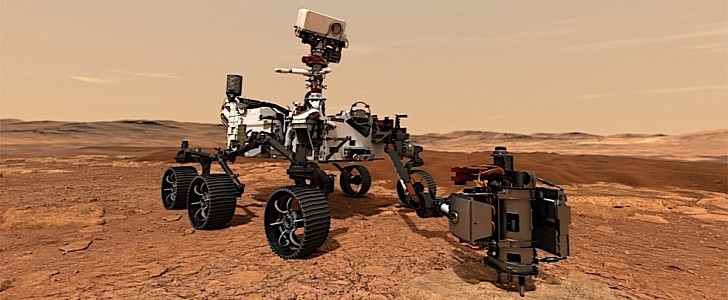For decades now, humans have gotten used to sending various machines to places far away from our home planet. Most of the time, they stay there, either sending back valuable data for a limited period of time or getting lost for future generations to find. By the end of this decade, though, one mission will land on Mars and then come back home with pieces of the Red Planet.
Mars Sample Return is how NASA and ESA call the mission, and the first stage is already underway. One of the tasks the Perseverance rover will have to perform once on Mars is to collect soil samples, hide them in collection tubes, and deposit them at either select locations or internally.
By the end of the decade, another mission will depart to Mars with the goal of collecting Perseverance’s samples and sending them back to Earth. There are several critical pieces of hardware taking part in this phase of the mission: a lander to bring down to Mars a sample fetch rover, an ascent vehicle to take the samples up into orbit, and an orbiter to catch them and head back to our planet.
In mid-December, NASA said it agreed to advance to Phase A of the program, meaning it “will mature critical technologies and make critical design decisions, as well as assess industry partnerships.”
"Returning samples of Mars to Earth has been a goal of planetary scientists since the early days of the space age, and the successful completion of this MSR key decision point is an important next step in transforming this goal into reality," said in a statement Thomas Zurbuchen, associate administrator for science at NASA Headquarters in Washington.
"MSR is a complex campaign, and it encapsulates the very essence of pioneering space exploration – pushing the boundaries of what's capable and, in so doing, furthering our understanding of our place in the universe."
Having pieces of Mars on Earth will open up previously unavailable methods of research thanks to the much more advanced equipment available here, and scientists are hoping to uncover the neighboring planet’s secrets faster this way.
By the end of the decade, another mission will depart to Mars with the goal of collecting Perseverance’s samples and sending them back to Earth. There are several critical pieces of hardware taking part in this phase of the mission: a lander to bring down to Mars a sample fetch rover, an ascent vehicle to take the samples up into orbit, and an orbiter to catch them and head back to our planet.
In mid-December, NASA said it agreed to advance to Phase A of the program, meaning it “will mature critical technologies and make critical design decisions, as well as assess industry partnerships.”
"Returning samples of Mars to Earth has been a goal of planetary scientists since the early days of the space age, and the successful completion of this MSR key decision point is an important next step in transforming this goal into reality," said in a statement Thomas Zurbuchen, associate administrator for science at NASA Headquarters in Washington.
"MSR is a complex campaign, and it encapsulates the very essence of pioneering space exploration – pushing the boundaries of what's capable and, in so doing, furthering our understanding of our place in the universe."
Having pieces of Mars on Earth will open up previously unavailable methods of research thanks to the much more advanced equipment available here, and scientists are hoping to uncover the neighboring planet’s secrets faster this way.

